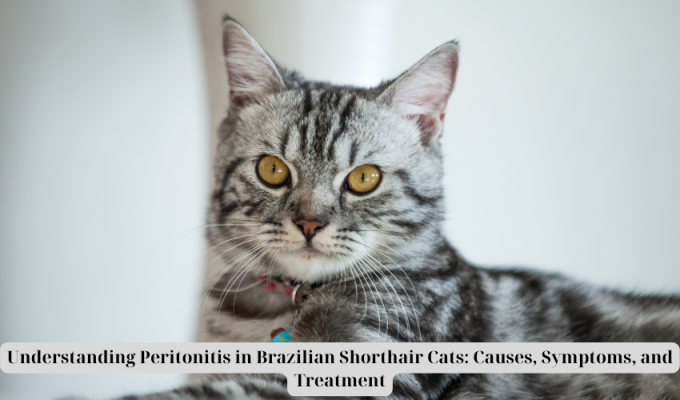
Explore the causes, symptoms, and treatment of peritonitis in Brazilian Shorthair cats.
Introduction to Brazilian Shorthair cats and their susceptibility to peritonitis
The content provided here discusses the guidelines for Feline Infectious Peritonitis (FIP) from the European Advisory Board on Cat Diseases. It provides information on the diagnosis, treatment, and characteristics of FIP, as well as the genetic variation and structure of the feline coronavirus (FCoV). The guidelines also address the availability of antiviral treatments and the importance of prompt diagnosis for effective treatment.
The information is written by experts from 11 European countries and is based on scientific research and knowledge in the field of FIP. The guidelines provide a comprehensive update on the current state of knowledge on FIP and associated FCoV infection.
The content also includes detailed information on the genome and structure of FCoV, as well as the differences between FCoV types I and II. It discusses the susceptibility of cats to FIP, especially pedigree cats and those under two years old.
The guidelines aim to provide veterinarians with the necessary diagnostic tools to determine the likelihood of a diagnosis of FIP quickly, so that effective antivirals can be used as soon as possible in countries where antivirals are available.
The causes of peritonitis in Brazilian Shorthair cats
Peritonitis in Brazilian Shorthair cats can be caused by a variety of factors, including infectious agents, trauma, and autoimmune conditions. Infections such as feline infectious peritonitis (FIP) and bacterial peritonitis can lead to inflammation of the peritoneum, the membrane lining the abdominal cavity. Trauma, such as a blunt force injury or a penetrating wound, can also cause peritonitis in cats. Additionally, autoimmune conditions, where the body’s immune system mistakenly attacks its own tissues, can lead to inflammation of the peritoneum.
It is important for cat owners to be aware of the potential causes of peritonitis in Brazilian Shorthair cats in order to recognize the symptoms and seek appropriate veterinary care. Common symptoms of peritonitis in cats may include abdominal pain, vomiting, diarrhea, and lethargy. Prompt diagnosis and treatment by a qualified veterinarian are essential for the well-being of affected cats.
In addition to infectious, traumatic, and autoimmune causes, other factors such as underlying health conditions and genetic predispositions may also play a role in the development of peritonitis in Brazilian Shorthair cats. It is important for cat owners to work closely with their veterinarians to identify and address any potential risk factors for peritonitis in their pets.
Understanding the symptoms of peritonitis in Brazilian Shorthair cats
Understanding the symptoms of peritonitis in Brazilian Shorthair cats
Peritonitis is a condition that can affect Brazilian Shorthair cats, causing inflammation of the peritoneum, which is the tissue lining the abdomen. The symptoms of peritonitis in Brazilian Shorthair cats can vary, but some common signs to look out for include:
1. Abdominal pain: Brazilian Shorthair cats with peritonitis may show signs of discomfort or pain in their abdomen. They may be reluctant to be touched or may exhibit signs of distress such as restlessness or vocalization.
2. Changes in behavior: Cats with peritonitis may exhibit changes in their behavior, such as decreased appetite, lethargy, or hiding. They may also show signs of discomfort when moving or walking.
3. Vomiting and diarrhea: Some Brazilian Shorthair cats with peritonitis may experience gastrointestinal symptoms such as vomiting or diarrhea. These symptoms can be indicative of an underlying abdominal issue.
It’s important to note that peritonitis can be a serious condition and requires prompt medical attention from a veterinarian. If you notice any of these symptoms in your Brazilian Shorthair cat, it’s essential to seek veterinary care for a proper diagnosis and treatment plan.
Remember, the information provided here is for general knowledge and should not replace professional veterinary advice. Always consult with a qualified veterinarian for specific guidance on your pet’s health.
The importance of early detection and diagnosis of peritonitis in Brazilian Shorthair cats
The importance of early detection and diagnosis of peritonitis in Brazilian Shorthair cats is crucial for ensuring the well-being and health of these feline companions. Peritonitis is a serious condition that can have detrimental effects on the overall health of cats, and early detection can lead to more effective treatment and management of the disease.
Early diagnosis of peritonitis in Brazilian Shorthair cats can help veterinarians and pet owners to implement appropriate treatment plans and interventions. By identifying the signs and symptoms of peritonitis early on, it is possible to mitigate the progression of the disease and improve the prognosis for affected cats.
In addition to early detection, accurate diagnosis of peritonitis in Brazilian Shorthair cats is essential for providing targeted and effective medical care. Veterinary professionals rely on diagnostic tools and tests to confirm the presence of peritonitis and determine the most appropriate course of action for each individual cat.
It is important for pet owners to be aware of the potential signs of peritonitis in Brazilian Shorthair cats and to seek prompt veterinary attention if any concerning symptoms are observed. By prioritizing early detection and diagnosis, pet owners can play a proactive role in safeguarding the health and well-being of their feline companions.

The role of genetics and breed predisposition in peritonitis in Brazilian Shorthair cats
The role of genetics and breed predisposition in peritonitis in Brazilian Shorthair cats is an important area of study for veterinarians and cat owners. Understanding the genetic factors that may predispose certain breeds of cats to peritonitis can help in early detection and prevention of the disease.
Genetic studies have shown that certain breeds, such as the Siamese and Abyssinian, may have a higher predisposition to developing peritonitis. This suggests that there may be specific genetic markers or mutations that make these breeds more susceptible to the disease.
Furthermore, research has also indicated that certain genetic variations within the immune system of cats may play a role in their susceptibility to peritonitis. This highlights the importance of understanding the genetic makeup of individual cats in order to provide personalized care and preventive measures.
In addition to genetics, environmental factors and overall health also play a significant role in the development of peritonitis in cats. It is important for cat owners to work closely with their veterinarians to understand the genetic and environmental factors that may impact their cat’s health and take appropriate measures to prevent and manage peritonitis.
Overall, the role of genetics and breed predisposition in peritonitis in Brazilian Shorthair cats is a complex and multifaceted area of study that requires further research and collaboration between veterinarians, geneticists, and cat breeders. By understanding the genetic and environmental factors that contribute to peritonitis, it is possible to improve the health and well-being of cats, including the Brazilian Shorthair breed.
Treatment options for peritonitis in Brazilian Shorthair cats
Treatment options for peritonitis in Brazilian Shorthair cats can vary depending on the severity of the condition. In mild cases, treatment may include antibiotics to address any underlying bacterial infection, as well as pain management and supportive care. In more severe cases, surgery may be necessary to remove any abscesses or infected tissue in the abdomen. It is important to consult with a veterinarian to determine the best course of treatment for each individual cat.
In some cases, peritonitis may be caused by an underlying condition such as pancreatitis or inflammatory bowel disease. In these instances, treatment will focus on addressing the primary condition in order to resolve the peritonitis. This may involve dietary changes, medication, and ongoing management of the underlying condition to prevent recurrence of peritonitis.
It is important for cat owners to closely follow their veterinarian’s recommendations for treatment and to monitor their cat’s progress closely. Peritonitis can be a serious and potentially life-threatening condition, so prompt and appropriate treatment is essential for the best possible outcome for the cat.
Managing the long-term care and recovery of Brazilian Shorthair cats with peritonitis
Managing the long-term care and recovery of Brazilian Shorthair cats with peritonitis can be a challenging but essential process for ensuring the well-being of the affected animals. It is important to work closely with a veterinarian who has expertise in feline infectious peritonitis (FIP) and experience in managing the condition in cats. This will ensure that the appropriate treatment and care plan is established for each individual cat, taking into account their specific needs and health status.
In addition to medical treatment, providing a supportive and comfortable environment for Brazilian Shorthair cats with peritonitis is crucial for their long-term care and recovery. This may include creating a quiet and stress-free space for the cat to rest, providing nutritious and easily digestible food, and ensuring access to clean water at all times. Regular monitoring of the cat’s symptoms and overall condition is also important to track their progress and make any necessary adjustments to their care plan.
Furthermore, it is important to consider the emotional well-being of Brazilian Shorthair cats with peritonitis. Providing them with affection, attention, and mental stimulation can help alleviate stress and contribute to their overall recovery. Engaging in gentle playtime, interactive toys, and positive interactions with their human caregivers can help improve the cat’s quality of life during their recovery process.
Overall, managing the long-term care and recovery of Brazilian Shorthair cats with peritonitis requires a comprehensive approach that addresses their medical, environmental, and emotional needs. By working closely with a knowledgeable veterinarian and providing a supportive and nurturing environment, it is possible to optimize the cat’s chances of recovery and improve their overall well-being.
The importance of preventative measures and care in reducing the risk of peritonitis in Brazilian Shorthair cats
The importance of preventative measures and care in reducing the risk of peritonitis in Brazilian Shorthair cats cannot be overstated. Peritonitis is a serious and potentially life-threatening condition in cats, and it is crucial for cat owners to take proactive steps to minimize the risk of this disease in their pets.
One important preventative measure is to ensure that Brazilian Shorthair cats receive regular veterinary check-ups and vaccinations. Vaccinations can help protect cats from certain infectious diseases that may lead to peritonitis. Additionally, regular check-ups allow veterinarians to monitor the overall health of the cat and address any potential health issues early on.
Another important aspect of preventative care is maintaining a healthy diet and lifestyle for Brazilian Shorthair cats. A balanced diet, regular exercise, and proper grooming can all contribute to the overall well-being of the cat and reduce the likelihood of developing conditions that may lead to peritonitis.
In addition to these measures, cat owners should also be vigilant about observing any changes in their cat’s behavior or health. Early detection of symptoms such as fever, loss of appetite, and abdominal discomfort can prompt timely veterinary intervention, potentially preventing the progression of conditions that may lead to peritonitis.
It is important for cat owners to consult with a qualified veterinarian for personalized advice on preventative measures and care specific to their Brazilian Shorthair cats. By taking a proactive approach to their pet’s health, cat owners can significantly reduce the risk of peritonitis and ensure the well-being of their beloved feline companions.
In conclusion, peritonitis in Brazilian Shorthair cats is a serious and potentially life-threatening condition that requires prompt diagnosis and treatment. Pet owners should be vigilant for the signs and symptoms of peritonitis and seek veterinary care as soon as possible to ensure the best outcome for their feline companions.





